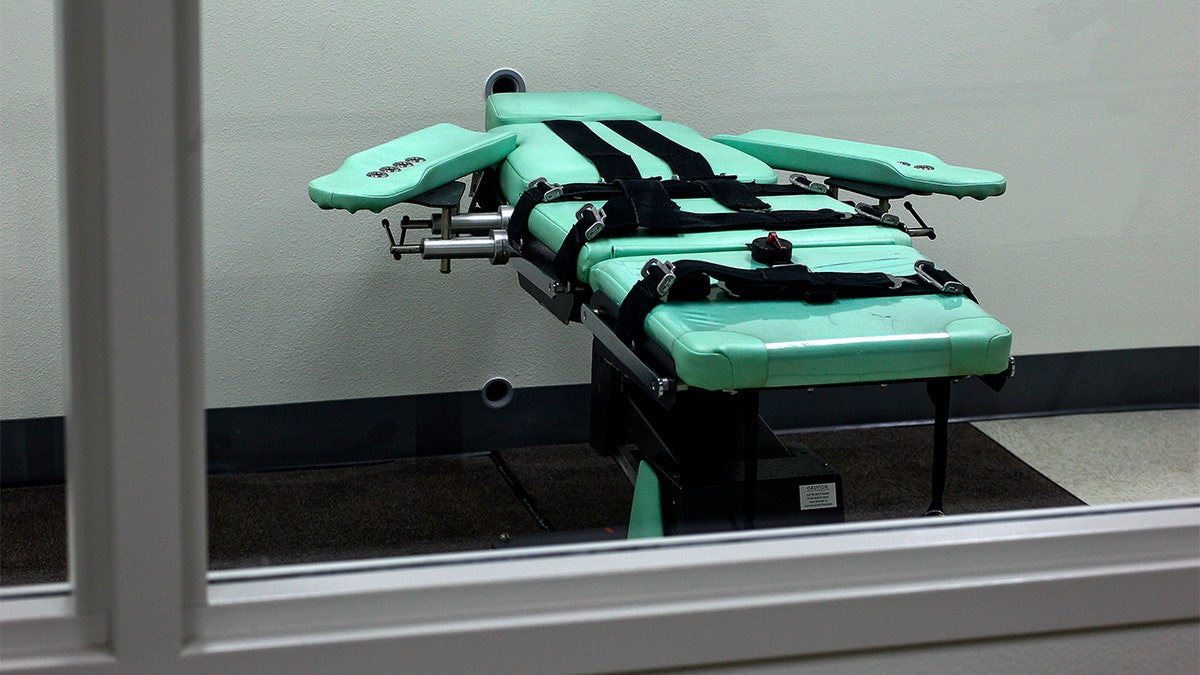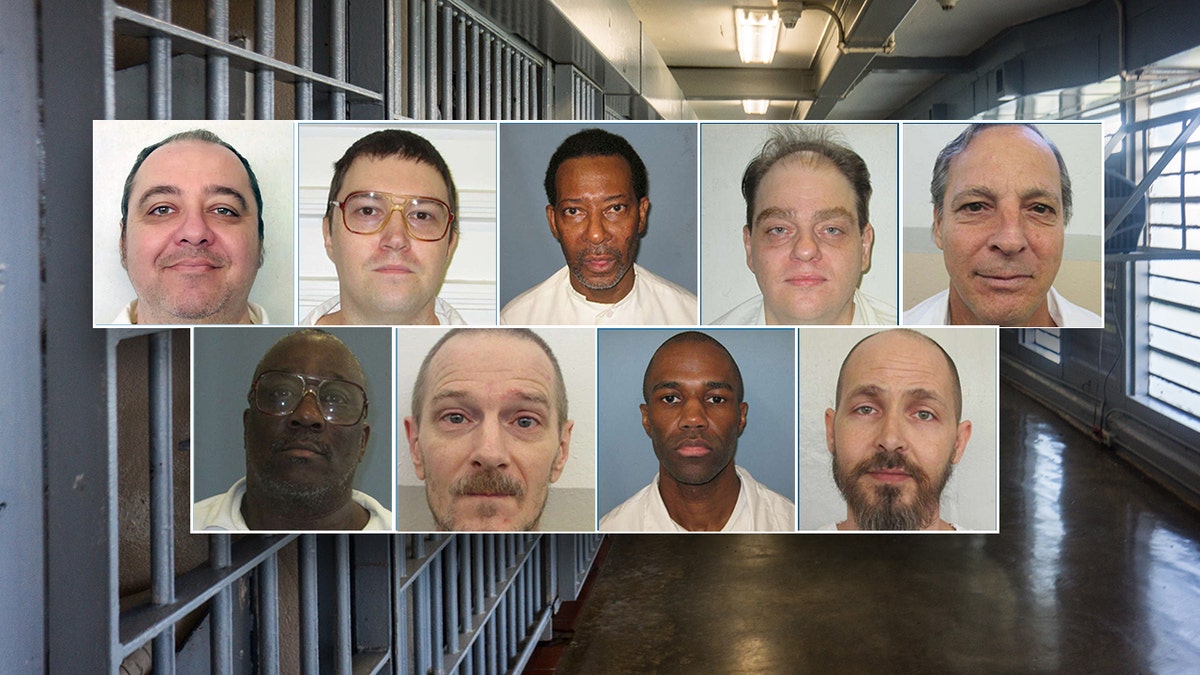Despite his legal team’s best attempts to halt the process, an Alabama judge ruled that Kenneth Eugene Smith will be the first human being to be put to death via nitrogen hypoxia later this month.
Smith, now 58, was sentenced to death in 2022 for the 1988 contract killing of a preacher’s wife, whom he and accomplice John Forrest Parker stabbed eight times for $1,000 apiece.
In November 2022, Smith was nearly executed by lethal injection, but he managed to live another day after executioners bungled the procedure. His attorneys claimed in legal filings that putting him back into the state’s execution chamber would constitute double jeopardy, and that to test the new execution method on the inmate would violate his constitutional rights.
But U.S. District Court Judge R. Austin Huffaker rejected their request for a preliminary injunction on his scheduled January 25 execution – he acknowledged that the method is new, but noted that the lethal injection process was also new once.
This undated photo provided by the Alabama Department of Corrections shows inmate Kenneth Eugene Smith, who was convicted in a 1988 murder-for-hire slaying of a preacher’s wife. In a complaint filed Wednesday, December 13, 2023, lawyers for Rev. Jeff Hood, a spiritual adviser to the Alabama inmate scheduled to be executed with nitrogen gas, said that restrictions on how close the adviser can get to the inmate in the death chamber are “hostile to religion.” (Alabama Department of Corrections via AP, File)
Although Smith’s attorneys adequately relayed the theoretical risks of the process in their filings, he wrote, those risks do not rise to an unconstitutional violation:
“Smith is not guaranteed a painless death,” Huffaker wrote in his 48-page Wednesday ruling. “On this record, Smith has not shown, and the court cannot conclude, the Protocol inflicts both cruel and unusual punishment, rendering it constitutionally infirm under the prevailing legal framework.”
The judge also wrote that there wasn’t sufficient evidence that death by nitrogen hypoxia “is substantially likely to cause Smith superadded pain short of death or a prolonged death.”
The execution method, detailed by the Alabama Department of Corrections in a heavily-redacted 41-page protocol, calls for a respirator-like mask to be placed over Smith’s nose and mouth. Breathable air will gradually be replaced with nitrogen gas, causing the inmate to die of a lack of oxygen – in theory, without the painful sensations of being unable to breathe.
ALABAMA CLEARED TO BECOME FIRST STATE TO EXECUTE INMATE WITH NITROGEN GAS: COURT

Executioners failed to find a vein to properly administer a lethal cocktail to Smith on September 17, 2022. After four hours strapped to a gurney and repeatedly prodded with needles, he was released, trembling, to return to his cell. (Photo By Michael Macor/The San Francisco Chronicle via Getty Images)
Smith’s attorneys also raised concerns that Smith may be unable to pray or give his final words with the mask affixed over his face, and that the process might prohibit his spiritual adviser from entering the room due to risks posed by the colorless, odorless nitrogen that could seep from his mask.
But in a court filing, the state wrote that Smith’s adviser, Rev. Dr. Jeff Hood, could enter Alabama’s death chamber at Holman Correctional Facility to pray with and anoint Smith in oil before the procedure begins.
“Horror is an understatement,” Hood told the Associated Press of Huffaker’s ruling. “The State of Alabama now has the permission of a federal court to suffocate its citizens.”
In one of Smith’s earlier appeals, Supreme Court justices Samuel Alito and Clarence Thomas wrote in their dissent that hypoxia should not be considered a viable alternative to lethal injection, because it has never been used and cannot be humanely tested, according to court filings.
But due to repeated “botched” executions in Alabama – which has acknowledged problems with IV insertion in at least four executions since 2018, three of which were halted and never reattempted – at least eight inmates living on the state’s death row specifically petitioned to be executed by the new method after it was approved in 2018.
ALABAMA INMATE TO BE EXECUTED BY NITROGEN GAS IN JANUARY 2024, WILL MARK FIRST USE OF NEW METHOD

Pictured are eight Alabama death row inmates who petitioned to die by nitrogen hypoxia in 2018 – Carey Dale Grayson, Demetrius Frazier, David Lee Roberts, Robin Dion Myers, Gregory Hunt, Geoffrey Todd West, Charles Lee Burton, and David Wilson. (Mugshots: Alabama Department of Corrections | Background: Photo by Giles Clarke/Getty Images)
Initially, Smith was one of those inmates – but since Alabama Department of Corrections Commissioner John Q. Hamm confirmed that he would be the first to die by the new method, the condemned hitman’s legal team has changed their stance.
“Both before and after the failed first attempt, Smith voices his preference that any execution be conducted by nitrogen hypoxia,” his attorneys wrote in their latest filing on Wednesday. “After the failed first attempt, the state honored Smith’s request… now, and unsurprisingly, Smith objects to that method too, at least under Alabama’s current protocol.”
His attorneys offered up amendments to the state’s existing protocol for the method or “Utah’s firing squad execution protocol” as alternatives.
Smith is not guaranteed a painless death.
Deborah Denno, a death penalty expert at Fordham Law School, explained opponents’ opposition to the state’s existing written guidelines for the nitrogen hypoxia method, calling it the “vagu[est] protocol [she’d] ever seen.”
“You would want everything specified about exactly what is going to take place. His attorneys have nothing to work with,” she said Monday. “It gets very redacted when you get down to the execution itself. They mention all these cylinders, but they have no idea what they’re talking about. … How is it getting there? How is it being transported? How is it being put into cylinders? Is someone coming in and filling cylinders? This is critical information that we would need to know about any execution method.”
“You have much more detail in states that electrocute people,” she contextualized. “For example, you have details on what kind of sponge they’re using. What’s going to be done with their hands? You don’t know that with nitrogen. How do we know the inmate can’t take the mask off?”
Earlier this month, the United Nations’ Human Rights Council pushed to stop Alabama from following through with Smith’s scheduled execution under the new method.
But Alabama Attorney General Steve Marshall said Wednesday’s ruling moves the state closer to “holding Kenneth Smith accountable for the heinous murder-for-hire slaying” for which he was convicted.
“Smith has avoided his lawful death sentence for over 35 years, but the court’s rejection today of Smith’s speculative claims removes an obstacle to finally seeing justice done,” he said in a statement.
Smith and Parker, who was executed via lethal injection in 2010, killed Elizabeth Dorlene Sennett on her husband’s behalf. The preacher was deeply in debt and wanted to collect insurance, according to the Clark County Attorney’s Office.
The woman was stabbed and beaten in a killing staged to look like a home invasion gone awry, Alabama.com reported.
Sennett killed himself a week after his wife’s death, court documents show.
Previously, Marshall’s office argued that nitrogen hypoxia would “cause unconsciousness within seconds” and “cause death within minutes,” the Associated Press reported. In court filings, the process has been compared to the quick deaths of industrial workers who were exposed to the gas and passed out quickly.
The phenomenon has also been observed in the field of aviation, where pilots can pass out or die at altitudes over 10,000 feet, according to the Federal Aviation Administration.
CLICK HERE TO GET THE FOX NEWS APP
But Smith’s attorneys have noted in their court filings that the American Veterinary Medical Association only approves death by nitrogen hypoxia for pigs and not other animals in their 2020 euthanasia guidelines, because the process could create an “anoxic environment that is distressing for some species.”
Should his execution using the gas fail, the 11th Circuit Court has ruled that Alabama can make no further attempts to execute Smith. The question of whether it will ultimately proceed could end up before the U.S. Supreme Court.